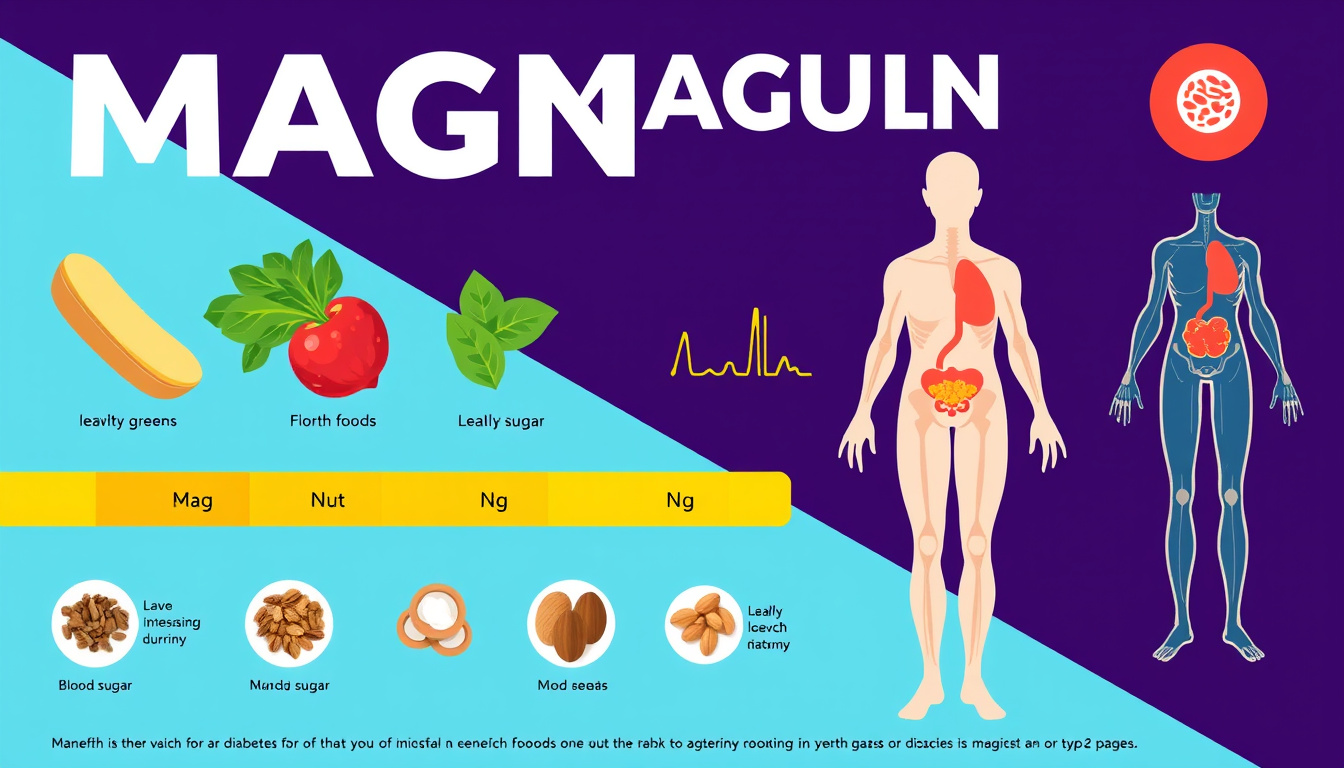Unlocking the Benefits of Magnesium for Managing Type 2 Diabetes: What You Need to Know
 Jill Smith
Jill SmithType 2 diabetes is a chronic condition that affects millions of individuals worldwide, presenting a range of challenges in blood sugar management and overall health.
With research continually evolving, one mineral that has gained attention for its potential benefits in managing this condition is magnesium.
In this article, we will delve into the importance of magnesium for diabetes type 2, exploring its role in blood sugar regulation, the implications of magnesium deficiency, and practical strategies for increasing your magnesium intake through diet and supplementation.
Understanding the connection between magnesium and diabetes can empower individuals to make informed dietary choices that support their health.

Key Takeaways
- Magnesium plays a crucial role in regulating blood sugar levels in individuals with type 2 diabetes.
- A deficiency in magnesium can worsen diabetes management and increase insulin resistance.
- Incorporating magnesium-rich foods into your diet can support better blood sugar control.
- Supplementation of magnesium may be beneficial, but it's essential to consult a healthcare professional first.
- Practical dietary tips can help you easily include more magnesium in your everyday meals.
Understanding Type 2 Diabetes and its Challenges
Type 2 diabetes is a chronic condition that affects millions worldwide, characterized by insulin resistance and elevated blood sugar levels.
The journey of managing this disease can be fraught with challenges, including the need for dietary modifications, consistent exercise, and routine monitoring of blood glucose levels.
One area that has garnered attention in recent years is the potential role of magnesium for diabetes type 2 management.
Research suggests that adequate magnesium intake may play a crucial role in improving insulin sensitivity and glucose control.
This essential mineral is involved in numerous biochemical reactions in the body, and low magnesium levels have been linked to an increased risk of developing type 2 diabetes.
Therefore, incorporating magnesium-rich foods, such as leafy greens, nuts, seeds, and whole grains, or considering a supplement under medical guidance, can be beneficial not only for overall health but specifically for those battling diabetes.
Understanding the intricate relationship between magnesium and diabetes type 2 can provide valuable insights and additional strategies for managing this complex condition.
The Role of Magnesium in Blood Sugar Regulation
Magnesium for diabetes type 2 is gaining recognition as a vital mineral that plays a significant role in blood sugar regulation.
Studies have shown that adequate magnesium levels can improve insulin sensitivity, helping the body effectively manage blood glucose levels.
This is particularly important for those dealing with type 2 diabetes, as insulin resistance is a core issue in this condition.
Magnesium acts on the pancreas to support insulin secretion and also influences the way cells respond to insulin.
Furthermore, low magnesium levels can exacerbate complications associated with diabetes, underscoring its importance in the diet of anyone managing this chronic condition.
Incorporating magnesium-rich foods, such as nuts, seeds, whole grains, and leafy greens, may enhance blood sugar control and support overall metabolic health, making magnesium an essential component of nutritional strategies for diabetes management.
'The greatest wealth is health.' - Virgil

How Magnesium Deficiency Affects Diabetes Management
Magnesium plays a critical role in diabetes management, particularly for those with Type 2 diabetes.
Studies have indicated that a deficiency in magnesium can lead to impaired insulin secretion and action, exacerbating the blood sugar control issues faced by individuals with this condition.
Low magnesium levels are also linked to an increased risk of insulin resistance, making it even more challenging to manage diabetes effectively.
By incorporating magnesium for diabetes type 2 management, patients may experience improved glucose control and better overall metabolic health.
Foods high in magnesium such as leafy greens, nuts, seeds, and whole grains should be included in the diet, as they not only help replenish magnesium levels but also provide essential nutrients that support overall health.
Additionally, magnesium supplements can be considered under the guidance of healthcare providers to ensure optimal dosage and effectiveness.
Ultimately, maintaining adequate magnesium intake is key to enhancing diabetes management and promoting better health outcomes for those living with Type 2 diabetes.
Best Dietary Sources of Magnesium
When managing diabetes type 2, incorporating the right nutrients into your diet is crucial, and magnesium for diabetes type 2 can play a significant role.
This essential mineral aids in various bodily functions, including regulating blood sugar levels.
The best dietary sources of magnesium include leafy green vegetables like spinach and kale, which are not only rich in magnesium but also low in calories, making them ideal for weight management.
Nuts and seeds, such as almonds and pumpkin seeds, are also excellent sources, providing healthy fats that can support heart health.
Whole grains, especially brown rice and quinoa, contribute substantial amounts of magnesium while providing fiber, which helps in maintaining stable blood sugar levels.
Consider incorporating these magnesium-rich foods into your meals to enhance your overall health and effectively manage diabetes.

Supplementation: Is it Effective for Type 2 Diabetes?
As the prevalence of Type 2 Diabetes continues to rise globally, many individuals seek ways to manage their condition effectively through lifestyle changes and supplementation.
Among the various supplements available, magnesium for diabetes type 2 has garnered attention due to its potential benefits.
Research indicates that magnesium plays a crucial role in insulin sensitivity and glucose metabolism.
Adequate magnesium levels may help to regulate blood sugar levels, reducing the risk of complications associated with diabetes.
However, while supplementation can be beneficial, it is essential for individuals to consult healthcare professionals before adding magnesium to their regimen.
Personalized advice ensures that the supplementation aligns with each individual's health profile and diabetes management plan, maximizing efficacy while minimizing any potential risks.
Practical Tips for Incorporating Magnesium into Your Diet
Incorporating magnesium into your diet can be particularly beneficial for those managing diabetes type
2.
Magnesium plays a crucial role in insulin sensitivity and glucose metabolism, making it an essential mineral for blood sugar management.
To increase your magnesium intake, consider adding magnesium-rich foods such as leafy greens, nuts, seeds, and whole grains to your meals.
For example, a handful of almonds or a spinach salad can easily boost your magnesium levels.
Additionally, incorporating legumes like black beans or chickpeas not only provides magnesium but also adds fiber, which is important for overall dietary health.
Utilizing magnesium supplements could also be an option, especially if you find it hard to meet your requirements through food alone.
However, it's important to consult with a healthcare provider before starting any new supplement regimen, particularly for those with diabetes type 2, to ensure it aligns with your individual health goals.
Regularly incorporating these foods and considering supplements may help support better blood sugar control, enhancing your overall well-being.
Frequently Asked Questions
What is the relationship between magnesium and Type 2 diabetes?
Magnesium plays a crucial role in insulin sensitivity and blood sugar regulation, which are key factors in managing Type 2 diabetes.
A sufficient intake of magnesium may help improve glycemic control and reduce the risk of complications.
How does magnesium deficiency impact individuals with Type 2 diabetes?
Magnesium deficiency can worsen insulin resistance and hinder blood sugar control, making it more challenging to manage Type 2 diabetes effectively.
It can also lead to other complications associated with diabetes.
What are the best dietary sources of magnesium for those with Type 2 diabetes?
Some of the best dietary sources of magnesium include leafy greens (like spinach), nuts (especially almonds and cashews), seeds (like pumpkin or chia seeds), whole grains, and legumes.
Is magnesium supplementation effective for managing Type 2 diabetes?
Studies suggest that magnesium supplementation may be beneficial for improving insulin sensitivity and glycemic control in individuals with Type 2 diabetes.
However, it's important to consult with a healthcare professional before starting any supplements.
What are some practical tips for incorporating more magnesium into my diet?
To increase magnesium intake, try to include more magnesium-rich foods in your meals, such as adding spinach to smoothies, snacking on nuts or seeds, and opting for whole grains over refined grains.
Additionally, consider tracking your daily intake to ensure you are meeting your magnesium needs.
Turn Back the Clock: Unlock the Secrets to Reverse Diabetes in 30 Days. Don't Wait! Download Now
Subscribe to my newsletter
Read articles from Jill Smith directly inside your inbox. Subscribe to the newsletter, and don't miss out.
Written by
